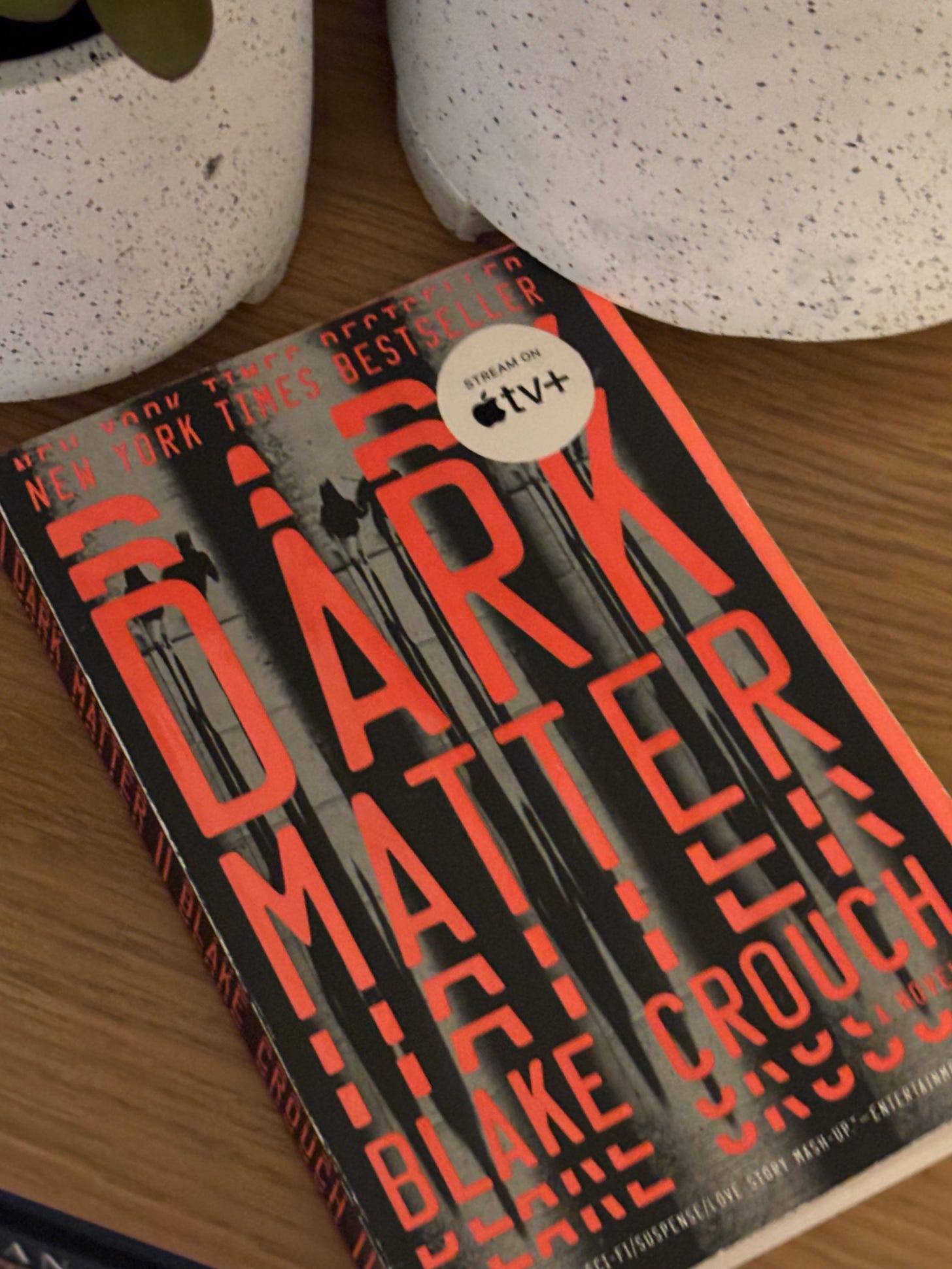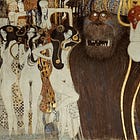Write It Before You Rewrite It
From “Dark Matter”, “The Midnight Library”, “The Collected Regrets of Clover”, and my life as Head of Product, I’ve learned one thing: write down the why — or relive the what-ifs.
Dark Matters
Friday, 11 p.m. Kindle battery: 9%. Mental battery: same.
I’m anxiously rereading “Dark Matter” and wondering why past me crowned it five stars on Goodreads.
"Dark Matter" by Blake Crouch — a story about a man whose life regrets lead him to make troubling decisions — was my favorite book of 2016. I told everyone to read it and convinced several friends to book-club it with me. It’s now 2025, and I’ve once again persuaded my friends to read it for another book club.
The problem is, now that I’m rereading the book, I can’t remember why I liked it so much and I’m doubting my decision to recommend it for a second time.
What was it about this book that captivated me so much? This book is about a middle-aged man scientist’s dilemma between his love and his career??? How did 2016-me connect with this?
Ah, as I edit this essay, I realize how. Anywayssss.
In 2016, I left the 5 stars and nothing else. Why 5 stars?
No notes, no reviews — certainly no Substack about it. By failing to capture my own reactions, I've erased them: I honestly can’t recall the book at all, and here I am, speed‑reading and second‑guessing my decision to recommend it again.
I wish I had written a review in 2016 to remember if this book ever brought me joy. Was joy even on my mind? I wish I remembered what I valued back then.
I wish I had written notes so I could reference them in this Substack.
Most of all, I wish I could recall how "Dark Matter" made me feel in that moment — which decisions I was questioning, which thoughts first surfaced.
I feel sad and distant from my own self.
Rereading “Dark Matter” on Kindle, I feel like Jason, seeing highlights from a stranger — and the stranger is me.

More shelves, more regrets
Lately, I've found myself drawn to books exploring themes of regret. “Dark Matter” was just one of them.
"The Collected Regrets of Clover" follows a death doula who catalogs others' last words while neglecting to make — and document — meaningful changes in her own life.
"The Midnight Library" drops Nora into infinite lives, but because she never documented the "why" behind her major decisions, she can only make choices based on emotion and regret.
These two novels share the same "cozy reads" category and deliver the same uncomfortable message: unprocessed, unrecorded feelings inevitably become unanswered questions.
Data not doom!
Regrets suck! I don't wish them on anyone!
The worst version of Jason goes crazy regretting his life and, honestly, that is relatable. People really do lose their minds, hate their past selves, and worry themselves into anxiety and depression.
You don't have to be full of regrets though, even if your life didn't work out as planned.
A regret is a past decision that fills you with negative feelings. However, your current emotions shouldn't overshadow both your past mindset and your future path.
Your decisions — whether big or small — can simply be neutral data points that help you make the next decision.
I really do think that the more we know about ourselves and this world, the better we can make decisions for the future. Turn regrets into intel!
My own regrets :(
At book club, I was yapping about how I can’t relate to the books above because I don’t have many big regrets.
My two reasons for that are:
I actively pursue things that matter to me. When I wanted to switch careers, I did it. I embrace travel opportunities. I don't pine after people — I get to know those I'm interested in. I explore my hobbies instead of just dreaming about them. I live out my worlds!
I document and, therefore, remember the reasoning behind all my important decisions.
I have smaller regrets, sure, like wearing the wrong thing at the wrong time or choosing the wrong plan out of many options. And yes, I complain! I say things like "I hate myself!" to a few very patient loved ones.
But after the bad mood passes, after I make a mistake, I examine the "why" behind my decision.
If that "why" stems from a negative place — anxiety, lack of focus, or poor time management — I try to let it go and focus on doing better next time.
If my decision came from a good hopeful place, like I took a risk hoping it’d work out, even if it didn’t, I honor my decision. No regrets!
Decision Logs!
People feel regret when they focus more on the outcome — which they couldn't really predict 100% anyway — rather than on the person they were and the context they had at the moment the decision was made. Often, they can’t even remember why they made that decision and feel just stupid and bad about themselves, wondering “whyyyy am I like this”.
I see the same amnesia at tech companies. They launch a feature, celebrate, then six months later someone wonders why they built it. If the original decision notes are missing, they end up reverse‑engineering their own product. Projects stall and team lore mutates.
As Director of Product, I log all major decisions: the problem we faced, the options we considered, who made the final call, and their reasoning behind it.
When I realized how significantly this practice was benefiting my team, I thought, "If I do it for work, why not do it for my own life?" So I started logging as many of my personal decisions as I could. (I already write out pros and cons to think through decisions anyway. Adding a log of the decisions themselves doesn't take much longer but provides enormous value.)
Here's what I record for my daily life:
the problem I'm trying to solve
my available options
the decision
who made the final decision (usually me but sometimes I’m peer pressured)
how I feel about the decision
what I think will happen
Later, I add the actual outcome and how I feel about what happened.
Example: Decision to make my writing public!
Problem: I write all the time. Coworkers and my friends are asking me to publish things but I don’t feel ready to be a “writer”. Should I do it?
Options:
Write for myself only, never publish
Publish my writing soon
Publish my writing when I’m ready
Decision made: I decided to make a Substack without waiting.
Who made the decision? At the end, me.
How I feel about the decision in the moment? Proud & nervous. I don’t feel ready but I have no idea if I’d ever feel ready.
What I think would happen? I think I’ll enjoy writing for the people who asked for it. I think I’ll enjoy building a community around writing. Even if a few people connect to my writing, it isn’t a waste of time or effort.
Reflection: I did build a community around my writing and do feel more connected to people because of it. It’s been a few years and I don’t feel like stopping any time soon.
If I had started a Substack driven by feelings of failure and dreams of instant wealth, I'd be deeply disappointed right now. Without my notes, I might have forgotten my true reason for writing — connection with others — and instead obsessed over my lack of monetary success. I might have even rewritten history about why I began writing in the first place “why did I think I’d become rich from this???”. That's precisely why documenting the "why" matters so much! It keeps you honest with yourself and reduces disappointment.
Interested in trying Decision Logging? I'd be happy to share a refined template — either directly with you or as a public post. Just email, message, or comment below!
More of my writing on decision making:
On making decisions with purpose
On prediction and music
Here I tell you exactly how to make decisions and I’m very serious too
See, I’ve been publishing for a while. I’m glad I made the decision to write on Substack. It’s a lovely place!
Write the Tiny Details, Write the Big Feelings, Write write write
Rereading "Dark Matter," I'm struck by how it's quietly the most pro‑writing novel I've ever read.
Jason, jumping from world to world to find his own, literally has to write — page after frantic page — to lock in the feelings that open the right door. Until his words become honest and specific, he keeps crash-landing in the wrong world.
Jason can't remember exactly what his world is, so he can't get back into it; he needs the right feeling and the right details.
"all the tiny, seemingly insignificant details upon which my world hangs."
And to get the right feelings and details, it helps him to write.
I find this to be quite a joyful message from the author. We can't control that much in life, we can't change our past, but we can get better at writing, reflecting, and decision-making.
Write, write, write. Write reviews. Write your truth. Write for yourself.
Be specific. Add the tiny details. Document big feels.
Write for your current self. Writing honestly helps you make clearer decisions in the moment and stay focused in the future.
Write for your future self. When doubt clouds your mind and life, your words will be there — a window back to your past self.
Infinite worlds are fun in fiction, but in real life memory is a flimsy narrator. Write now, thank yourself later.
I'm grateful that Blake wrote “Dark Matter” and I have no regrets that I reread it. I'm going to make sure to write a review this time 😅!
I found the ending quite joyful. In fact, I find books about multiverses both joyful and comforting — they open my world and remind me that I'm many things at once, that life is full of infinite possibilities.
Still, the multiverse can keep its what-ifs. I’ll stick to one timeline, one pen and a paper trail — because regrets hate receipts.
- Katya, who probably won’t regret publishing this, especially if you like or comment!







Love decision logs, please share!
Isn’t it frustrating when you forget something personal, wish you had an AI to remember it for you, and then instantly regret it, because relying on AI makes everything feel a bit too artificial and impersonal?